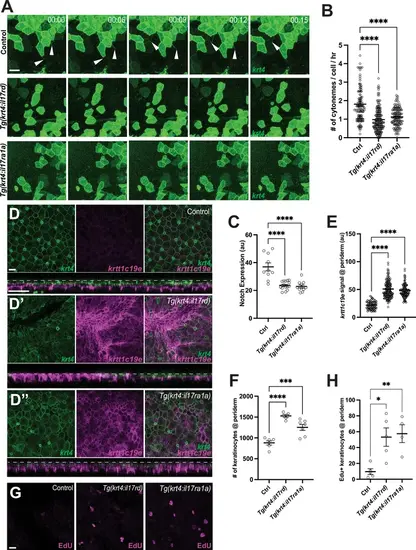Fig. 5
- ID
- ZDB-FIG-250825-101
- Publication
- Wang et al., 2025 - Cytoneme-mediated intercellular signaling in keratinocytes is essential for epidermal remodeling in zebrafish
- Other Figures
- All Figure Page
- Back to All Figure Page
|
Disruption of epidermal maintenance by Interleukin-17 receptor overexpression. Overexpression of il17rd or il17ra1a in krt4+ keratinocytes results in (A, B) a significant reduction in cytoneme extension (F2, 325 = 38.48, p < 0.0001, N=328 cells, 10 larvae total), and (C) decreased Notch responsiveness (F2, 34 = 23.16, p < 0.0001, N=37 larvae total) (Figure S5E). (D–D”) The periderm is disrupted in (D’) Tg(krt4:nVenus-v2a-il17rd;krt4:lyn-EGFP;krtt1c19e:lyn-tdTomato) and (D”) Tg(krt4:nVenus-v2a-il17ra1a;krt4:lyn-EGFP;krtt1c19e:lyn-tdTomato) compared to the (D) properly arranged periderm of Tg(krt4:lyn-EGFP;krtt1c19e:lyn-tdTomato), resulting in (D’, cross-section) an increased krtt1c19e signal in the periderm (E) (F2, 287 = 109.7, p < 0.0001, N=29 larvae total) and (F) an increased number of keratinocytes in the periderm (F2, 15 = 27.79, p < 0.0001, N=18 larvae total). (G, H) Edu+ peridermal keratinocytes are significantly increased in il17 receptor overexpressed larvae (F2, 11=8.259, p=0.0065, N=14 larvae total). Statistical significances were assessed by One-way ANOVA followed by Tukey’s HSD post hoc test. Scale bars: 20µm (A, D, G). Error bars indicate mean ± SEM. |

